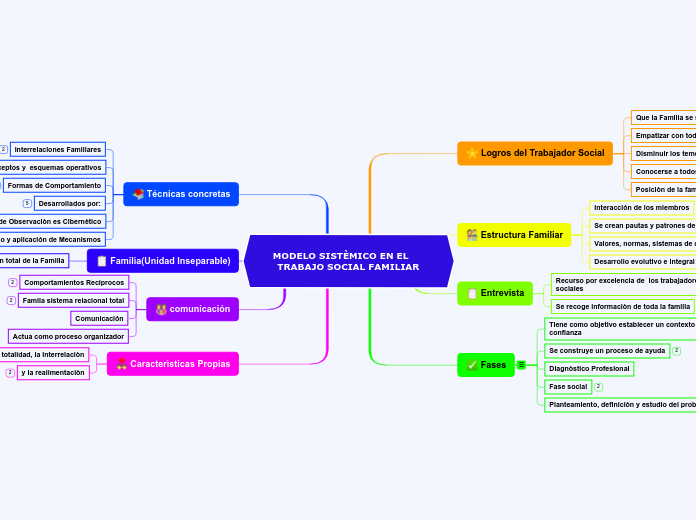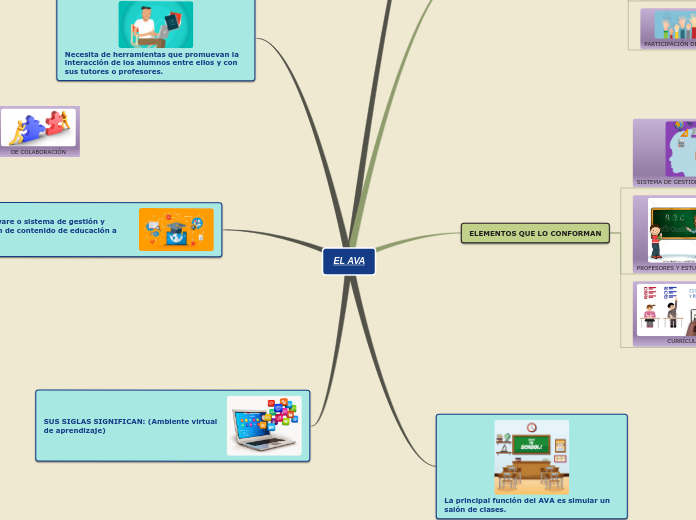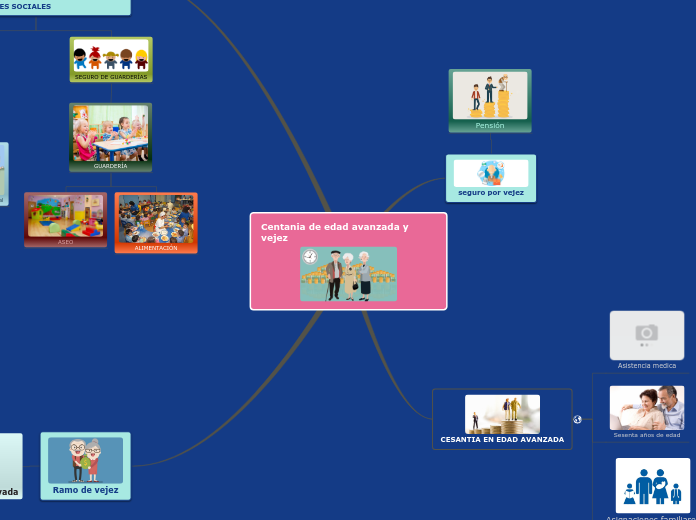MODELO SISTÈMICO EN EL TRABAJO SOCIAL FAMILIAR
The part of speech is a category to which a word is assigned according to its syntactic functions. In English the main parts of speech are noun, pronoun, adjective, determiner, verb, adverb, preposition, conjunction, and interjection.
Caracterìsticas Propias
A conjunction is a word like 'if' 'but' or 'and' which is used to connect sentences or clauses together.
y la realimentaciòn
Subordinating conjunctions are conjunctions that are used at the beginning of subordinate clauses. Some examples of these conjunctions are: although, after, before, because, how, if, once, since, so that, until, unless, when etc.
Although it was raining, I went out.
La totalidad, la Interrelaciòn
Coordinating conjunctions always connect phrases, words, and clauses. They are: for, and, nor, but, or, yet, so.
comunicación
A preposition is one of the most exciting parts of grammar. A preposition is used to describe the location of something in relation to something else.
Actua como proceso organizador
A group of words used with the force of a single preposition is called phrase preposition.
Comunicación
When a preposition consists of more than one word, it is called double preposition.
Famlia sistema relacional total
Compound preposition consists of two or more words.
on behalf of, according to, in front of, from across, etc.
Comportamientos Recíprocos
When a preposition consists of one word it is called single or simple preposition.
in, at, on, to for, of, from, up, after, over, under, with, etc.
Familia(Unidad Inseparable)
An interjection is used to express emotion in a sentence.
Think of other interjections!
Observación total de la Familia
Técnicas concretas
An adverb is used to describe a verb, but it can also describe an adjective or another adverb.
Adverbs normally help paint a fuller picture by describing how something happens.
Estudio y aplicación de Mecanismos
Especially, Specifically, Merely, Either
El Mètodo de Observaciòn es Cibernètico
A lot, Little, Much
Desarrollados por:
The intensifiers strengthen adverbs adjectives and adverbs and down- toners make them weaker.
La Teoria de la Comunicaciòn
Fairly, Rather
La Teoria General de los Sistemas
Extremely, Very
Formas de Comportamiento
Just, Afterward, Soon, Currently
Se relaciona con conceptos y esquemas operativos
Interrelaciones Familiares
Carefully, Slowly
Fases
Referencias bibliográficas
Palomar, M. (2015). El modelo Sistémico. Sciences, 1-20
https://rua.ua.es/dspace/bitstream/10045/5868/1/ALT_02_10.pdf
A pronoun is a word that can be used in place of a noun, typically after the noun itself has already been stated.
Planteamiento, definiciòn y estudio del problema
Interrogative pronouns are used in questions. Although they are classified as pronouns, it is not easy to see how they replace nouns. Who, which, what, where, and how are all interrogative pronouns.
Which, Who
Fase social
Reciprocal pronouns are used for actions or feelings that are reciprocated. The reciprocal pronouns are each other and one another.
Each other, one another
Diagnòstico Profesional
A reflexive pronoun ends with ...self or ...selves and refers to another noun or pronoun in the sentence (usually the subject of the sentence). The reflexive pronouns are myself, yourself, herself, himself, itself, ourselves, yourselves, and themselves.
Se construye un proceso de ayuda
Demonstrative pronouns are used to demonstrate (or indicate). This, that, these, and those are all demonstrative pronouns.
This, These
Tiene como objetivo establecer un contexto de confianza
The personal pronouns are I, you, he, she, it, we, they. More often than not (but certainly not always), they replace nouns representing people.
He, They
Entrevista
An adjective is a word that's used to describe a specific noun and to provide more detail to the listener.
Se recoge informaciòn de toda la familia
Superlative adjectives demonstrate a higher level of comparison between entities.
She is the prettiest princess.
Recurso por excelencia de los trabajadores sociales
Expresses a comparison between two entities or groups of entities in quality or degree.
Estructura Familiar
A noun is defined as a person, place, thing or idea. Proper nouns always begin with a capital letter. Common nouns, which are general words, such as 'cars,' are not capitalized.
Desarrollo evolutivo e integral de las personas
Compound nouns are words where two nouns have been stuck together to make a new noun. Compound nouns should be written as one word, without a hyphen.
Valores, normas, sistemas de creencia y reglas
A noun which refers to a group of things/people.
Family, Class
Se crean pautas y patrones de conducta
Countable nouns are nouns that can be counted, even if the number might be extraordinarily high.
Uncountable nouns are nouns that come in a state or quantity which is impossible to count; liquids are uncountable, as are things which act
like liquids.
Interacción de los miembros
Proper nouns are the names of specific people or places. They should always begin with a capital letter.
Mary, Paris
Logros del Trabajador Social
A verb is an action word or 'doing' word that signifies movement in some way.
Posiciòn de la familia
An auxiliary verb helps the main (full) verb and is also called a 'helping verb.' With auxiliary verbs, you can write sentences in different tenses, moods, or voices.
You have been practicing hard.
Conocerse a todos
A participle is a verb form that can be used as an adjective or to create a verb tense. There are two types of participles: Present participle (ending -ing) and Past participle (usually ending -ed, -d, -t, -en, or -n).
The winning athlete gets a trophy.
Disminuir los temores
A modal is a type of auxiliary (helping) verb that is used to express: ability, possibility, permission or obligation. The main modal verbs in the English language are: can, could, may, might, must, shall, should, will, would.
Create sentences
I might go to the park if I get my homework done.
Empatizar con todos
A linking verb connects the subject with a word that gives information about the subject, such as a condition or relationship.
Visiòn de la Familia
Que la Familia se sienta còmoda
A verb with its own meaning: a verb that is not an auxiliary verb.
Esperanzas de la Familia









